|
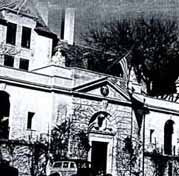
|
Main Building at Huntington, Former Home of a one-time Financier, Houses Trainees and Officers of the U. S. Maritime Service Radio School |
United States Maritime Service Radio Training Station Huntington, Long Island, New York
|

|
Main Building at Huntington, Former Home of a one-time Financier, Houses Trainees and Officers of the U. S. Maritime Service Radio School |
This is Huntington
MAST Magazine, January 1944
In his memoirs, General von Ludendorf, the chief-of-staff of the German army during World War I, stated that the American people knew the true meaning of total war. He was, of course, referring to the miraculous manner in which the United States converted from peacetime economy to the war effort in 1918.
Today, Ludendorf's counterparts in the Axis military set-up are again being taught -- the hard way -- this lesson in the American way of waging a war.
A prime example of this American penchant for improvisation and conversion to the war effort is to be seen on a large Huntington, Long Island estate, the one time property of a patron of the arts. Here, the United States Maritime Service has over-night set in operation a unique radio school.
Where once members of the dilettante circles strolled and engaged in metaphysical discussion, some six hundred grimly determined young officer candidates now race along grand corridors and across terraced lawns bound for classes in electronics, code transmission, physics and mathematics. A spirit of purposefulness has replaced the atmosphere of idle pleasure, which reigned at this French style chateau.
These are her men
Men of all races, all creeds, white and black and of all backgrounds are sailing America's great merchant fleet today. Some are seeking adventure, some came seeking the better careers merchant shipping offers her workers now. But by far the majority came to serve the cause of democracy.Examine the roster of the crew of any Liberty Ship and see for yourself. Carpenter, student, clerk, baker, dress-salesman, machinist, farmer, printer, truck driver -- they're all there. A cross-section of the men of democratic America. And many are going to stay in the merchant marine. It's going to be their career for long after today's job is done and won.
The men at Huntington are preparing for careers in the merchant marine. They are representative of the men being trained at the various schools of the U. S. Maritime Service all over the country.
| Edward Bailey, 27, was a surveyor with the U. S. Army Engineers. Looking for a war job with a future, he chose the Maritime Service. |  |
Ten months service with the Army as a glider pilot gave James W. Lehman a liking for active war assignments. Upon receiving a medical discharge be enrolled for training at Huntington. | 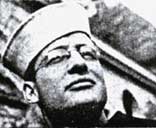 |
| Able-Bodied Seaman George Doan shipped on vessels of the U.S. Army Transport Service. He is aiming at an increase in rank and earnings. | 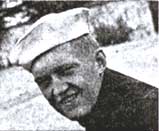 |
Formerly a motion picture projection operator, Wilbur George is an ardent bird-fancier and an amateur student of nature. Huntington affords him opportunity to indulge in his hobby while studying radio. |  |
| From trimming windows and singing in the church choir to radio communications officer on a merchant vessel may seem like a long step. Robert Palmer made it, and soon he'll be shipping out. |  |
William Clinton was a maintenance worker in a building in New York City. He's a graduate of a New York high school. After the war he intends to continue serving in the Maritime Service. |  |
| Bank Teller, Arthur Natvig, 27, was always interested in radio. As a hobby he was able to teach himself the rudimentary principles. His coming to Huntington was a natural. | 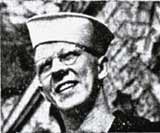 |
Back in his hometown in Ohio everybody figured William Schaffer would be a darn good photographer. But the war changed that and now Bill is going to sea soon as a radio officer. | 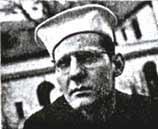 |
 |
Her
Skipper Commander Harry Manning, U.S.N.R., Superintendent |
Standing on a pier, with the cold breath of winter blowing up the whitecaps in New York Harbor, a short, thin lad of seventeen stood looking seaward late one evening toward the close of 1914. Occasionally he would read the lettering on a sheet of paper he held rolled loosely in his left hand. He was oblivious to the cold. Night fell and still the boy continued his watch. Hours later, Harry Manning, ninety-nine pounds and five feet and one half inches tall, still clinching the rolled sheepskin he had that day received from the New York Merchant Marine Academy, left the pier. He had finished his first watch.
During that first watch the lad had a talk with the sea, and they arrived at a working agreement -- a set of articles. Another year will see the completion of thirty years of the successful operation of that agreement between the boy, now Commander Harry Manning, USNR, Superintendent of the United States Maritime Radio Training School at Huntington, Long Island, and the sea Commander Manning has faithfully executed every detail of that agreement. And so has the sea.
They understand each other. It was this understanding of the sea, which catapaulted Harry Manning into the headlines in February 1929. An Italian freighter, the "Florida," was in distress. Harry Manning, then first officer of the SS "America" successfully effected the rescue of the entire crew of the distressed craft in a high sea. He knew the sea. Again, in 1937 he was navigator and chief radio operator for Amelia Earhart on the famous aviatrix's record breaking flight from San Diego to Honolulu. Press of important affairs kept him from undertaking the same duties on the flight which subsequently cost the aviatrix her life.
In 1938 a plane crash almost proved fatal for Commander Manning, but with characteristic determination he fought his way back to health and physical efficiency, despite compound fractures of both legs, his skull and jaw.
Steaming out of Singapore just ahead of the invading Japs, in February 1942 Commander Manning escaped with a shipload of refugees. Prior to this, during the delicate period before our entrance into the war, he out-witted German subs transporting American nationals from Europe.
Today, Commander Harry Manning is operating the United States Maritime Radio Training Station at Huntington with the same brand of efficiency which has been manifest in his career. A strict disciplinarian, the Commander uses discipline merely as a means to an end. He is interested in turning out seamen. And a disciplined seaman is the best seaman.
This Is Her Story
It is a story of achievement. As recently as 1938 the United States ranked eighth among maritime nations. Fully seventy percent of our exports were transported in foreign ships. During the years 1928 to 1937 only thirty-six seagoing merchant vessels were constructed! This was the state of our maritime affairs in 1938. In truth, the mighty had fallen. The United States, in the days of the famous clippers, was once the leading seafaring nation. Our Clippers, the finest sailing vessels ever devised by man, were seen on every sea, and in every port of commerce in the world, no matter how remote.Fortunately, a few citizens in this country realized the vital necessity for rejuvenating our merchant fleet and by dint of great patriotic effort and patience effected the passage of the Merchant Marine Act of 1936. Some of the provisions of this Act provide for the partial subsidization by our government for the building and manning of merchant ships. Practical operation of this plan was begun in 1937 by the United States Maritime Service. Today we have the greatest fleet of merchant vessels in the history of man. We are training officers and men for this expanding fleet at a rate which gives promise of America's preeminence in the maritime world for a good many years, if not forever.
The United States Maritime Service Radio Training Station at Huntington is a direct out-growth of the new policy. It is a streamlined school designed to turn out radio communications officers for the merchant marine. Although the idea is to turn out radio officers, this is not the stations only object. The production of good all around seamen and good all around merchant marine officers is the larger role. Out of the general intercourse and daily routine, by word, by action, by gesture, by attitude, the trainees take on a closer familiarity with their chosen career.
Candidates for radio officer training come from every state in the union and from every walk of life. Their average age is twenty-two and their average education is well above high school level. All have passed rigid entrance examinations before being admitted to the school, in addition to having completed five weeks of apprentice seaman instruction at either Sheepshead Bay, Hoffman Island, Avalon or St. Petersburg Maritime Service Training Stations.
The men who pass the radio school aptitude test, which measures general intelligence, mechanical comprehension, facility with numbers and code learning ability can have a feeling of self-confidence since only one-in-fifty eligible apprentice seamen pass.
A most important feature of the training here is the emphasis on the fact that the trainee is destined to be an officer and a gentleman, in every sense of the word. Qualities of leadership are stressed, a code of behavior developed, good manners and deportment are at all times required. The trainee soon realizes that a completely satisfactory officer holds, by his personal example, not only the respect of his men but their admiration and liking as well. These attributes are not taught formally, but their desirability and influence is made evident throughout the entire course of training.
Radio classroom at HuntingtonHis eight-week course at Huntington completed, he is then transferred to the Gallups Island Radio Training Station in Boston for advanced training and laboratory work. At Gallups Island the course has been lengthened to thirty-two weeks. Upon graduation from Gallups Island the officer candidate takes a Federal Communications Commission examination for a license as a full-fledged marine radio operator.
Men who graduate from Huntington maintain that working and studying amid the pleasant and quiet surroundings of this former estate has been a helpful factor in their completing the course successfully. Because of its fortunate natural location the facilities for outdoor recreation are unlimited. There are four softball fields, tennis courts, volleyball courts and horseshoe stakes. An indoor recreation hall is available for ping-pong, bowling, boxing, chess and checkers. No physical fitness or recreational program would be complete without the body conditioning effects which swimming gives; both the indoor and outdoor swimming pools at Huntington are in use constantly. A well stocked library for reading and studying is also available.
Despite the opulance of the surroundings, a trainee's life at this radio school is far from a round of "beer and skittles," nor can it be compared to life of a student at one of our hallowed ivy-covered universities. It is grim; and it is real. Never for an instant is the purpose behind this improvised institution forgotten, or neglected. Here, the true implication of General von Ludendorf's prophetic characterization of America is aptly illustrated by the United States Maritime Service.
An impressive sight at Huntington is the weekly review of the entire personnel by Station Superintendent Commander Harry Manning, formerly Master aboard the SS America and one-time navigator for aviatrix Amelia Earhart. With the polished gold buttons of their double breasted blue uniforms gleaming in the sunlight, the assembled trainees and officers standing smartly at attention as the inspecting party passes between ranks, the onlooker cannot but help feeling a surge of patriotic pride in this scene. These weekly reviews do much to make the officer candidate feel that he is indeed part of an organized and disciplined training program, and that he will soon play as vital a role in the war effort as any officer in any branch of the United Nations services.
There is a great difference between the career preparation given members of the armed forces this war and World 'War I. In the last war the training given men had very little bearing on their later activities. Scant consideration was given to the post-war rehabilitation of the individual. Today, however, the accent is on the future of the many insofar as is practical. The Maritime Service, in its training program, is making every effort to adhere to this principle.
A necessary and vital occupation during war-time, the profession of marine communications offers unlimited possibilities as a peacetime calling in our rapidly growing merchant marine. The men who are studying at the United States Maritime Radio Training Station at Huntington, Long Island today are laying the groundwork for a successful tomorrow. These men, and the careful training they are receiving at Huntington reassure America of its place as a leading maritime nation.
8/9/01
www.USMM.org ©1998-2001. You may quote small portions of material on this website as long as you cite American Merchant Marine at War, www.usmm.org as the source. You may not use more than a few paragraphs without permission. If you see substantial portions of any page from this website on the Internet or in published material please notify usmm.org @ comcast.net